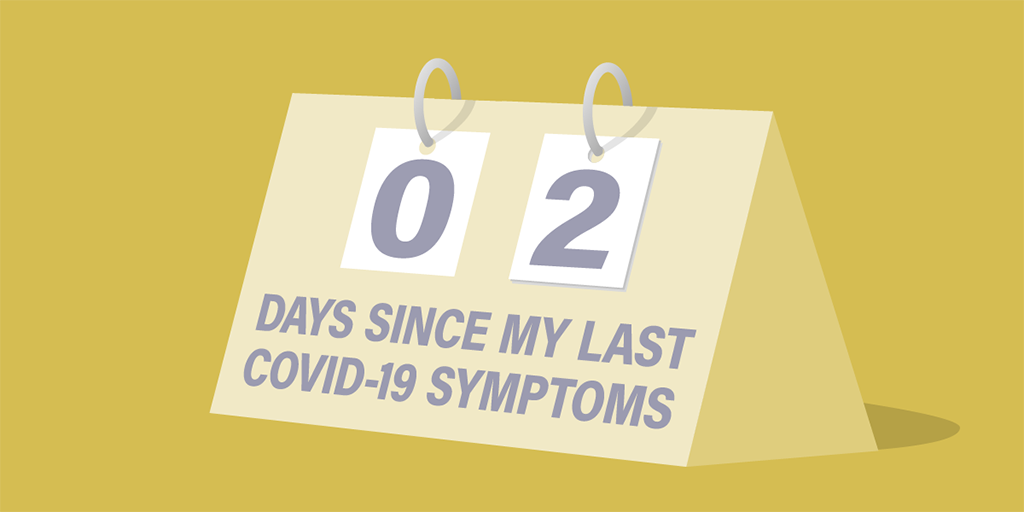how long did it take to clean up 9/11
May 13: MIT Medical answers your COVID-19 questions. Got a question about COVID-19? Send it to us at CovidQ@mit.edu, and we'll do our best to provide an answer. Today, you get a two-for-one deal, as we answer two related questions about recovery from the virus.
Question 1: How long after symptoms occur are you still contagious? Also, if you feel better for a couple days and then "relapse," are you still considered contagious?

There's a lot about this virus that is still unknown and unpredictable, not the least of which is how the course of recovery may progress for any individual patient. If you contract SARS–CoV-2, the virus that causes the COVID-19 illness, we can't tell you how sick you will get, which symptoms you will have, or how long it will take for you to fully recover. Nor can we say exactly how long you may be contagious. We've identified possible ranges for all of these things, but what we are most sure of is that the course of the illness varies greatly from person to person.
That said, the Centers for Disease Control and Prevention (CDC) has established minimal criteria for your return to whatever passes for "normal life" these days. If you've been sick with COVID-19, whether your illness was confirmed by testing or symptom-based criteria, the CDC recommends that you remain isolated for at least 10 days since symptom onset and up to 20 days in cases of severe illness.
What does "recovery" mean? According to the CDC, it means that you've gone three days without a fever, and without the use of fever-reducing medications, and that your other symptoms, such as cough or shortness of breath, have shown progressive improvement or have gone away completely. In other words, if you're fever free and improving for two days but start running a fever again or coughing more, that 72-hour countdown clock gets reset, and you'll need to start counting down those three days again as soon as you're once more fever free and otherwise improving.
Finally, keep in mind that these are minimal criteria. If you have the luxury of taking more time to be sure that you've finally, actually, really, truly recovered, you should take it. And coming out of isolation does not mean throwing caution to the wind. You should still continue taking the precautions we are all taking at this time — staying home as much as possible and, if you must go out, wearing a mask and maintaining social distance between others and yourself.
Question 2: My daughter is a nurse who was hospitalized with COVID-19 but has fully recovered. She's been tested several times since getting out of the hospital, but she is still testing positive after being symptom free for more than two weeks. Given her test results, how confident are you in the CDC's advice that people can stop self-isolating after being symptom free for 72 hours?
With good reason, the CDC recommends increased caution for healthcare providers returning to work after recovery from a confirmed or suspected COVID-19 illness. Some healthcare facilities follow the CDC's symptom-based strategy outlined above — at least 10 days since symptom onset and up to 20 days in cases of severe illness. Others, perhaps including the facility where your daughter works, use the CDC's alternative strategy, which requires two negative PCR tests administered within 24 hours.
"The phenomenon of individuals continuing to test positive for some time after they appear to have recovered is one we've known about for a while," says Dr. Shawn Ferullo, MIT Medical's chief of student health. "I've heard of people testing positive up to 37 days after their symptoms had completely disappeared. The test is extremely sensitive, so these are 'true positives' in the sense that the test truly is detecting genetic material from the virus, but the question is whether or not it is infectious viral material. Most of us now believe these individuals are not infectious, even though they continue to test positive and are being held out of work."
The CDC appears close to reaching the same conclusion, noting that "detecting viral RNA via PCR does not necessarily mean that infectious virus is present." While CDC research on this topic is ongoing and as yet unpublished, they note that they have been unable to culture viral specimens obtained from individuals more than nine days following the onset of symptoms. This means that these viral specimens were not capable of replicating — or, in other words, they were not infectious. In fact, the CDC's preliminary conclusion is that "the statistically estimated likelihood of recovering replication-competent virus approaches zero by 10 days or more than three days after recovery."
So, while your daughter may be held out of work for some time longer, you and she and can both be reassured that she is almost certainly fully recovered from the illness and no longer infectious.
how long did it take to clean up 9/11
Source: https://medical.mit.edu/covid-19-updates/2020/11/recovery-covid-19-how-long-someone-contagious
Posted by: elderwormse.blogspot.com

0 Response to "how long did it take to clean up 9/11"
Post a Comment